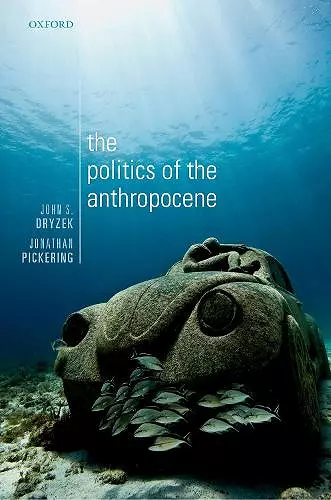The Politics of the Anthropocene
John S Dryzek author Jonathan Pickering author
Format:Paperback
Publisher:Oxford University Press
Published:13th Dec '18
Currently unavailable, and unfortunately no date known when it will be back

Winner of the 2019 Clay Morgan Award Committee for Best Book in Environmental Political Theory
This is a book about how politics, government - and much else - needs to change in response to the transition from the Holocene to the Anthropocene, the emerging epoch of human-induced instability in the Earth system and its life-support capacities.The Politics of the Anthropocene is a sophisticated yet accessible treatment of how human institutions, practices, and principles need to be re-thought in response to the challenges of the Anthropocene, the emerging epoch of human-induced instability in the Earth system and its life-support capacities. However, the world remains stuck with practices and modes of thinking that were developed in the Holocene - the epoch of around 12,000 years of unusual stability in the Earth system, toward the end of which modern institutions such as states and capitalist markets arose. These institutions persist despite their potentially catastrophic failure to respond to the challenges of the Anthropocene, foremost among them a rapidly changing climate and accelerating biodiversity loss. The pathological trajectories of these institutions need to be disrupted by advancing ecological reflexivity: the capacity of structures, systems, and sets of ideas to question their own core commitments, and if necessary change themselves, while listening and responding effectively to signals from the Earth system. This book envisages a world in which humans are no longer estranged from the Earth system but engage with it in a more productive relationship. We can still pursue democracy, social justice, and sustainability - but not as before. In future, all politics should be first and foremost a politics of the Anthropocene. The arguments are developed in the context of issues such as climate change, biodiversity, and global efforts to address sustainability.
The book is persuasive and beautifull written, bringing forth a realistic and optimistic account of how humanscan reorganize themselves to better govern in the emerging epochPerhaps most importantly, the book offers hope that human reason and communication with one another and with the Earth system can rise to the challenges of the Anthropocene. * Jen Iris Allan, Cardiff Unviersity, EIA *
This is a salutatory warning for social scientists who study international institutions and the United Nations system, but one that needs to be taken seriously especially when it runs against the overwhelming impetus to be "policy relevant" to generate solutions to what are presented as solvable "problems". The Anthropocene requires more fundamental thinking, and as such this volume is a useful antidote to technocratic assumptions that there are simple solutions to issues that are better coped with reflexively as sets of interconnected complicated changing circumstances. * Simon Dalby, Wilfrid Laurier University, Academic Council on the United Nations System *
ISBN: 9780198809623
Dimensions: 234mm x 157mm x 12mm
Weight: 320g
208 pages